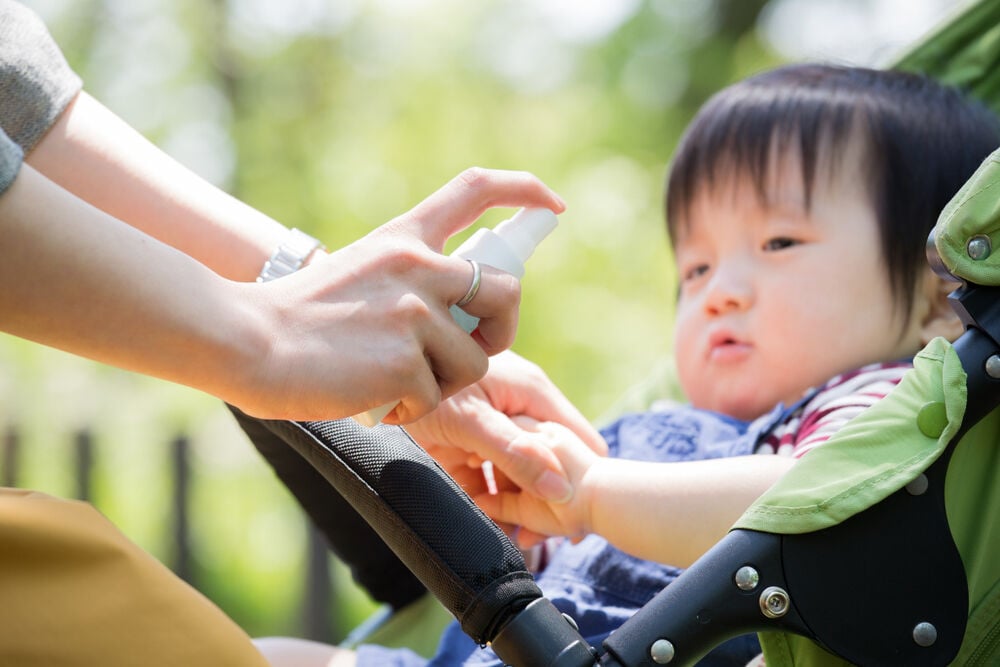As a new parent, it's normal to feel extra cautious about your baby's health. When it comes to their delicate skin, bug bites may seem like a cause for worry. Despite the fact that they may cause temporary itchiness and pain, most bug bites are harmless. Let's find out the symptoms of bug bites, how to treat them, and when to seek medical attention.
-
Tracking cycle
-
Getting pregnant
-
Pregnancy
-
Help Center
-
Flo for Partners
-
Anonymous Mode
-
Flo app reviews
-
Flo Premium New
-
Secret Chats New
-
Symptom Checker New
-
Your cycle
-
Health 360°
-
Getting pregnant
-
Pregnancy
-
Being a mom
-
LGBTQ+
-
Quizzes
-
Ovulation calculator
-
hCG calculator
-
Pregnancy test calculator
-
Menstrual cycle calculator
-
Period calculator
-
Implantation calculator
-
Pregnancy weeks to months calculator
-
Pregnancy due date calculator
-
IVF and FET due date calculator
-
Due date calculator by ultrasound
-
Medical Affairs
-
Science & Research
-
Pass It On Project New
-
Privacy Portal
-
Press Center
-
Flo Accuracy
-
Careers
-
Contact Us
Bug Bites in Babies: Symptoms You Shouldn’t Ignore


Every piece of content at Flo Health adheres to the highest editorial standards for language, style, and medical accuracy. To learn what we do to deliver the best health and lifestyle insights to you, check out our content review principles.
Symptoms of bug bites in babies
There can be many types of bug bites, caused by anything from mosquitoes to bees to spiders. Symptoms from bug bites often include pain, rash, or swelling. Let's explore them further.
Pain at the bite site
Not all bug bites hurt; however, some might cause a bit of pain. When an insect bites into your baby's skin, it injects saliva in the area. This saliva can cause irritation and pain, as the body recognizes it as a foreign substance.
Bug bite: rash and redness
The saliva released by the bug in the bite area also causes your baby's immune system to respond. This response is what causes the bite area to develop a rash and become red.
Take a quiz
Find out what you can do with our Health Assistant
Bug bite: swelling at the bite area
The reason behind your baby's swollen skin after a bug bite is histamine. When a bug bites into their skin, the body's immune system kicks into action and the skin produces histamine. This substance increases the white blood cell (the protector cells) and the blood flow around the affected area, helping the bite wound heal faster.
Baby is scratching a bite: why do bug bites itch?
The same substance that causes the redness and swelling also causes your baby's bug bite to itch. Histamine stimulates the nerve cells around the bite area and causes them to send an itch signal to the brain.
Other common symptoms of bug bites
Apart from the symptoms noted above, other signs of a bug bite include a sensation of heat in and around the bite area and a feeling of numbness. In some cases, a tingling sensation can also impact the bite area.
How to treat a bug bite in babies
While most bug bites are harmless, they can still be a cause for nuisance to your baby. Here are a few ways to minimize the irritation and soothe the affected area:
- Wash the affected area to help with the redness and inflammation
- Apply calamine lotion to the affected area and let it dry — this will help soothe the bug bite rash
- Try to prevent your baby from scratching the bite area
- Apply a cool compression (a damp towel or a cold pack, for example) to help reduce the bug bite swelling
It's important to remember that bug bites are common in children, and not a reason for you to feel guilty! Timely and simple tips take care of them in most cases.
What should you do if you think your child has a tick?
Ticks are an unfortunate, yet common, cause of nuisance for children. Identifying bug bites caused by ticks is relatively simple, since they have telltale circular, bulls-eye shaped red bug bites. While most tick bites are harmless, some ticks can carry infections such a Lyme Disease and Rocky Mountain spotted fever. Make sure you check your baby for ticks in the areas where they are most common: around and in hair, ears, between the legs, and in the belly button.
Removing and treating tick bites
Ticks can be particularly tricky to remove. This is because they attach to the body by burrowing their head inside the skin. Here are some tips to help safely remove ticks from your baby's skin:
- Soak a cotton ball in soapy, mildly warm water. Let the ball sit over the tick-infested area for a minute or two. You will usually see the tick coming off with the ball.
- If the cotton ball method does not work, you may try removing the tick with the help of tweezers. Use the tweezer to clasp the head or mouth of the tick, which is close to your baby's skin. Then, firmly pull on the tick until it lets go of the skin. Make sure not twist the tweezer in the process, as this can cause the head to detach and stay behind in the skin.
How to recognize an infected bug bite in a baby
Usually, bug bites are temporary and clear up within a day or two. However, sometimes, they may become infected. An infected bug bite may show the following symptoms:
- Increasing redness, swelling, and rashes that seems to worsen with time, instead of subside
- Pus in and around the affected area
Symptoms of a possible allergic reaction to watch out for
In rare cases, your baby might be allergic to a certain type of insect bite. This can trigger an allergic reaction. Look out for these symptoms, which may indicate a possible allergic reaction:
- Severe itching that worsens with time
- A painful lesion at the area of the bite
- In case of a more serious allergic reaction, a larger swollen area with redness and rashes all over
In case you suffer from allergy and are breastfeeding your baby, keep these tips in mind while taking allergy medicine.
When to seek medical attention
If your baby shows the following symptoms, they may be experiencing a severe reaction to a bug bite. In such cases, seeking urgent medical attention is important:
- Wheezing, difficulty breathing
- Swelling of lips and tongue
- Turning pale and disoriented
- Rashes that are widespread, and severe itching
- Fainting
Keep in mind that in some cases bug bites can cause anaphylactic shock — a sudden, life-threatening allergic reaction. Signs and symptoms of anaphylactic shock include itching, sweating, diarrhea and vomiting, erythema, breathing problems, and swelling around the eyes and lips. If you see signs of a severe allergic reaction, immediately call the doctor.
Precautions for preventing a baby from getting a bug bite

Simple precautions can help prevent your baby from getting bug bites and ticks. Here are some handy tips to keep in mind:
- Insect repellents with up to 10% concentration of the chemical DEET are safe for infants. They are quite effective and easy to apply. Make sure to apply this on your baby after applying sunscreen.
- Repellents that contain citronella and cedar are also a good option. However, they may not be as effective s those that contain DEET. You may also have to reapply these repellents through the day, as their effectiveness is short lived.
- To prevent mosquito bites, try to keep the baby indoors after dusk. Having screens installed on your windows and doors is a good idea. You should cover the stroller with a screen when you go out, especially in the evening.
- Deer ticks are often carriers of serious infections like Lyme disease and Rocky Mountain spotted fever. To prevent deer ticks, keep your baby's body covered with clothing and apply repellent. Also, check your baby for ticks every day and remove them right away if spotted.
Insect bites is a common occurrence in infants, and not a reason to worry. Some of the most common bug bites are caused by mosquitoes, bees, ticks, and more. The usual symptoms are rashes, a red and swollen bug bite, and itching in the affected area. Most bug bites can be treated by washing the area and applying calamine lotion or cool pack. In some rare cases, bug bites may cause a severe allergic reaction that causes severe itching, wheezing, swollen lips, and even fainting. In such cases, it is important to seek urgent medical attention. Keeping your baby's body covered with clothing and applying effective insect repellent goes a long way to preventing bug bites.


Hey, I'm Anique
I started using Flo app to track my period and ovulation because we wanted to have a baby.


The Flo app helped me learn about my body and spot ovulation signs during our conception journey.


I vividly
remember the day
that we switched
Flo into
Pregnancy Mode — it was
such a special
moment.
Real stories, real results
Learn how the Flo app became an amazing cheerleader for us on our conception journey.
References
https://www.ncbi.nlm.nih.gov/pmc/articles/PMC3684411
https://www.nhsinform.scot/illnesses-and-conditions/injuries/skin-injuries/insect-bites-and-stings
https://www.mayoclinic.org/diseases-conditions/mosquito-bites/symptoms-causes/syc-20375310
https://www.mayoclinic.org/first-aid/first-aid-insect-bites/basics/art-20056593
https://www.mayoclinic.org/diseases-conditions/bee-stings/symptoms-causes/syc-20353869
https://www.rch.org.au/kidsinfo/fact_sheets/insect_bites_and_stings/
https://www.seattlechildrens.org/conditions/a-z/tick-bite/
https://parenting.firstcry.com/articles/mosquito-bites-in-babies-causes-and-remedies/#Sign_Symptoms_of_Mosquito_Bites_Infections_in_Infants
https://www.hse.ie/eng/health/az/b/bites,-insect/complications-with-insect-bites.html




